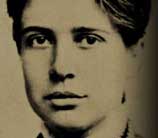Killings in revenge or from passion occur throughout this set of cases. Each is the remnant of a feud or complicated story, whose circumstances are only hinted at in the records here. Additional research in contemporaneous sources might begin to untangle some of the history which preceded the homicide.
The ongoing struggles between labor organizers, business owners, and the attempts of local, state and federal governments to control strikes and regulate working conditions are one of the overarching dramas of this entire period. Workers poured into Chicago from abroad and from the rural regions of America, and during the period revolutions in the nature of factories, and manufacturing and industry, were accompanied by revolutions, both attempted and actual, in the relations between hired workers and their employers. The confrontations were highly charged, politicized, and with large economic stakes on both sides.
The Haymarket Affair is the symbol and galvanizing event for both labor and management. Before and after the Haymarket Affair labor issues and political issues regarding employment and labor conditions are omnipresent (JCLC p.460-461). A number of contemporaneous accounts address working conditions and describe with great specificity the working conditions and living conditions for workers and their families in this period.
For further reading: 1000 Homeless Men, (1914)
Smith, Carl S., Urban Disorder and the Shape of Belief - The Great Chicago Fire; The Haymarket Bomb and the Model Town of Pullman. Chicago: U. of Chicago Press, 1995. A rich and unusually structured narrative, a political and social history, recreating the tapestry of events and contemporaneous commentary surrounding these three signature events in Chicago. The affect of the Haymarket trial and executions, only a year later, on the culture surrounding criminal justice and the courts was immediate and long lasting. The author sums up the contemporary mood of the city as follows: “The ‘apprehensive concern’ surrounding Haymarket was based in ‘the feeling and the fact that it is one phase, and the worse phase, of a widespread discontent upon the part of millions of the poorer people of this and other countries.’” p. 169. Internal citation omitted.
Lukas, J. Anthony, Big Trouble - A Murder in a Small Western Town Sets Off a Struggle for the Soul of America. New York: Simon & Schuster, 1997. Although a murder trial in Idaho is the principal story, a great deal of the relevant history and background, including the history of socialism, the labor movement and unions takes place in Chicago. The book includes a narrative of national and state politics of the period, and the social history and personalities of a number of key political and social figures prominent in Chicago, including: Clarence Darrow, the founder of the Pinkerton Agency, Theodore Roosevelt and Illinois Governor Altgeld.




